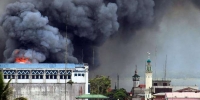
Adam Thomas on Flickr https://www.flickr.com/photos/devdsp/8359930452/
Diplomatic assets need boosting
Fundamental changes to the international order confront Australia with a complex range of foreign policy challenges. While it has many strengths to draw on, its diplomatic assets need to be resourced effectively if it is to succeed, Bob Cotton writes.
Tectonic forces are shifting world power and challenging the western-inspired global rules-based system. China asserts power and influence with growing military heft and economic reach. The country is building its presence in the South China Sea and promoting alternative international architecture, such as the Silk Road initiative and the Asian Infrastructure Investment Bank. Japan, the Republic of Korea and other Asian nations are increasing defence capabilities and refreshing relationships with the USA. Russia is an unsatisfied power seeking to renew influence and global reach. It invaded Crimea, destabilised Ukraine and has intervened in the Syrian conflict. It seeks to check NATO and profit from weakening European unity following Brexit.
ISIS and other Islamic terrorist groups continue to pose threats to Syria, Iraq and other Arab states. Turkey, Jordan and Lebanon have been severely impacted by terrorism and civil conflict. As ISIS loses territory in its self-proclaimed Caliphate, it strikes out at civilians in Europe and Asia and has declared Australia a target. Iran is repositioning after the nuclear deal, building on Shia influence and checking Saudi ambitions. The Israel/Palestine dispute remains beyond the reach of a negotiated solution. Libya and other North African states remain seriously fractured and open to ISIS and other Islamic terrorist movements.
Renewed action on arms control and disarmament for weapons of mass destruction remains of high importance, given the unpredictable nuclear ambitions of states such as North Korea and Pakistan, and the risk of terrorist groups gaining access to nuclear material.
Following the Brexit vote, European unity is under pressure as member states seek to enhance their sovereign power over migration and other laws, without being overridden by EU directives. There is significant unfinished business from the Global Financial Crisis with high youth unemployment and high levels of debt, as demonstrated by Greece. Unprecedented refugee flows from Syria, Iraq, North Africa and Asia have seriously challenged EU cohesion and put direct pressure on frontline states including Italy, Greece and Turkey.
Globally, there are challenges from climate change, cyber, and emerging and disruptive technologies. The Paris Agreement on halting global warming was hard won but remains fragile. It now requires states to commit to practical action by reducing carbon emissions, and by making use of renewables and other alternative energy sources. The benefits of the Internet and global connectivity are being targeted by cyber-attacks, with significant costs to governments and companies alike.
Closer to home, how does Australia promote its national interests with its key ally, the USA, and China, its major trading partner and source of tourists and migrants? Recent debate and decisions on Chinese investment in significant national infrastructure, political donations and signs that some permanent residents of Chinese origin are prepared to speak out in support of China’s policy, such as on the South China Sea, point to the complex challenges ahead. With a new US President in 2017, what might be asked of Australia, including under the ANZUS alliance? Republican Party candidate Donald Trump has been critical of the costs to the USA of supporting its global system of alliances. He has taken an antagonistic stance against Chinese trade and investment policies because of their impact on the USA’s economy and employment. He highlights the negative impacts of globalisation and foreshadows protectionist measures. If some of these policies begin to be implemented, Japan and South Korea among others would think carefully about how best to maintain their national security.
Another challenge for Australia is whether Operation Sovereign Borders can continue in its present form, given its high costs and impact on Australia’s reputation for ethical behaviour. The global movement of people is already high and likely to stay that way. What steps can Australia take with Malaysia, Indonesia, Thailand, Myanmar and other states to find more durable, cooperative solutions? Australian interests are engaged with its close neighbour PNG, which is due to hold a referendum in the next few years on whether Bougainville should be independent. The PNG High Court has found detention of refugee claimants on Manus Island to be illegal and against the PNG constitution. Fragile Pacific states such as the Solomon Islands will continue to be of concern.
Australia brings valuable assets to these tasks. The country has a strong record as an open and welcoming country, that is proud of its independence and robust democratic traditions since federation. It has welcomed many as settlers; more want to come. Australia has a strong economy and enviable resource endowment. It is currently ranked the 12th largest economy and is an active member of the G20, which has sought to coordinate global financial and economic policy. We have an active foreign policy with a wide network of partnerships and a proud reputation for working professionally and with diplomatic skill to enhance the rules-based international system on matters as diverse as international peace and security, the law of the sea and outer space. Australia is actively engaged in the UN and its major agencies. We are members of significant regional bodies such as the East Asian Summit, APEC and the Pacific Forum.
Australia has wide-ranging global and regional interests and will need to pursue these in a more complex environment. We will do this best by building effective partnerships and coalitions. We have underfunded the diplomatic assets we will need compared with similar G20 nations. Diplomacy and Aid need people and resources to help secure Australia’s future. Defence has clear funding guidelines aiming for 2 per cent of GDP, but can’t carry the security burden alone. Now is not the time to be cutting corners or implementing a one-size-fits-all efficiency dividend; it’s time to lock in Australia’s foreign policy assets and resourcing to ensure we have the capabilities to meet the challenges of the coming decades.
This article was first published by Policy Forum.net, the website of the Asia and the Pacific Policy Society and Crawford School. http://www.policyforum.net/diplomatic-assets-need-boosting/
Updated: 18 July 2024/Responsible Officer: Crawford Engagement/Page Contact: CAP Web Team












